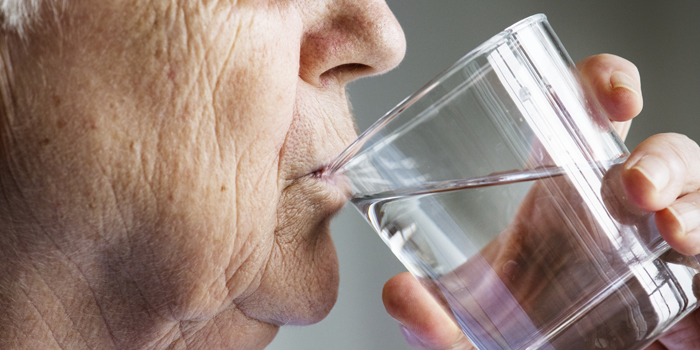It might have been fun to title this article “Seniors Need to Drink More”, but that might have been slightly misleading. The fact is that common thinking is that adults need to consume at least two quarts of liquids per day. And, while that is a nice, simple formula, not every person’s body is the same. Some people need more liquids on a daily basis.
Rather than depend on some random formula, there are a few tests that any person caring for an older adult can use to tell if he or she is consuming enough fluids.
Pinch Your Parent. You can quickly check hydration levels by pinching the skin on the back of the hand. If it quickly returns to its normal position everything is probably fine. If the skin stays elevated for a second or longer, it is a clear indication of dehydration.
Don’t Flush. When a person is adequately hydrated, his or her urine will be almost clear or pale yellow. As a caregiver, if you can observe the urine output of your elderly charge, it will go a long way toward telling you if there is an issue with hydration. If the urine is a darker yellow, there may be an issue.
The Obvious: Thirst. While it might seem apparent, if the person you are caring for expresses thirst, you may need to be more proactive in introducing fluids into the daily routine.
Possible Other Indicators. The list of symptoms below could come from a variety of maladies, but in combination, you may be looking at dehydration. This is actually a good thing, because it is often the easiest thing to fix. Look for any combination of the following:
- Fatigue
- Elevated heart rate
- Headaches
- Confusion
- Cotton mouth
- Infrequent urination
- Muscle cramps
- Constipation
- Dizziness
Easy Fix
Compared to the resolution of so many other maladies of older adults, dehydration is among the easiest to solve. It is as simple as drinking a glass of water immediately upon getting up in the morning followed by a breakfast beverage of coffee, tea, or juice. If that routine is continued throughout the day – both during and between meals – dehydration should cease to be an issue.
Also, it is not just liquids that can help. Many tasteful snacks contain a lot of water such as cucumber slices, cubes of melon, celery sticks, citrus fruit, grapes, and tomatoes, all of which have high water content. And many contain helpful antioxidants, too.

